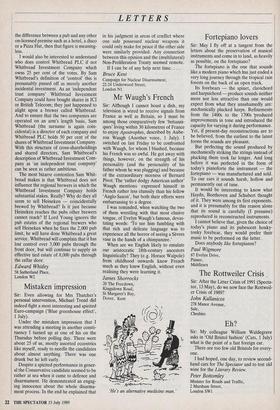Fortepiano lovers
Sir: May I fly off at a tangent from the letters about the preservation of musical instruments and come in to land, as heavily as possible, on the fortepiano?
The fortepiano is the one that sounds like a modern piano which has just ended a very long journey through the tropical rain forests on the back of an open truck.
Its forebears — the spinet, clavichord and harpsichord — produce sounds neither more nor less attractive than one would expect from what they unashamedly are: mechanically plucked harps. Refinements from the 1400s to the 1700s produced improvements in tone and introduced the capacity for varying it during performance. Yet, if present-day reconstructions are to be believed, from the earliest to the latest forms the sounds are pleasant.
But perfecting the sound produced by mechanically striking the strings instead of plucking them took far longer. And long before it was perfected in the form of today's pianoforte the instrument — the fortepiano — was manufactured and sold. To our ears it sounds harsh, hollow and permanently out of tune.
It would be interesting to know what . Haydn, Beethoven and Schubert thought of it. They were among its first exponents, and it is presumably for this reason alone that its sound is carefully (I presume) reproduced in reconstructed instruments. I cannot believe that, given the choice of today's piano and its pubescent honky- tonky forebear, they would prefer their music to be performed on the latter.
Does anybody like fortepianos?
Paul Wigmore
87 Evelyn Drive, Pinner, Middlesex


















































 Previous page
Previous page